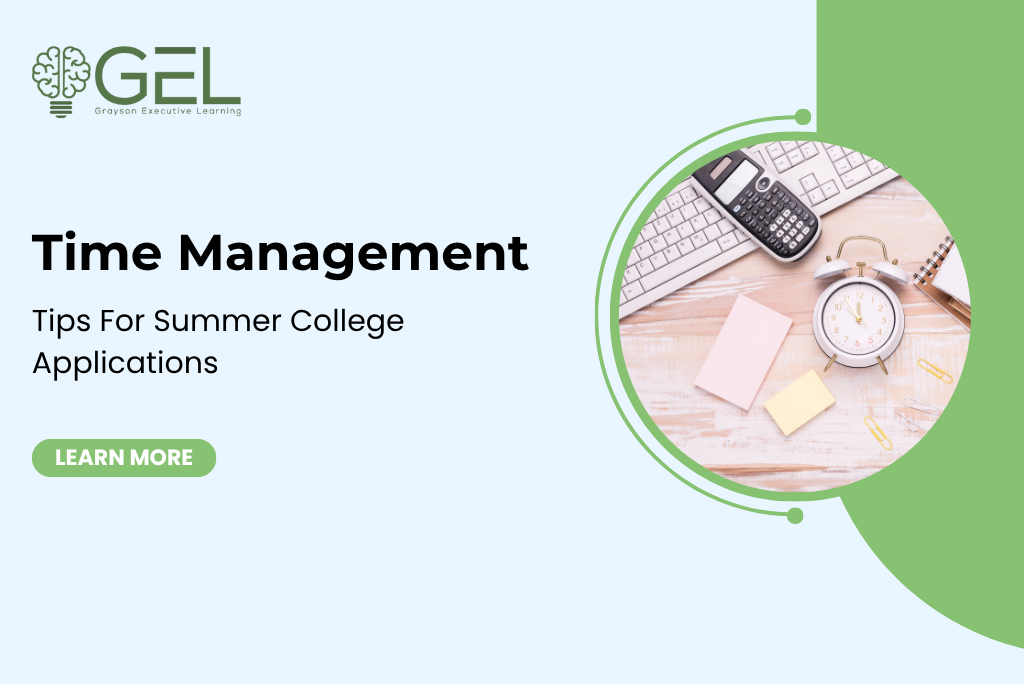For rising high school seniors, summer is often viewed as a much-needed break from academic demands. But if college applications are on the horizon, summer also offers a unique window of opportunity. With no school schedule dictating every hour, students have more freedom to prepare thoughtfully for one of the biggest transitions in their academic journey.
Grayson Executive Learning coaches work with many students who feel overwhelmed by everything college applications require: personal statements, resumes, standardized test prep, campus visits, and more. The good news is that a little time management can go a long way. With the right structure, your student can get ahead on their applications without sacrificing rest or summer fun.
Here are our top time management tips to help your student balance college prep with personal growth and relaxation this summer.
Create a Master Calendar Early
Start the summer with a visual plan. Create a calendar that includes deadlines for Common App submissions, essay drafts, test dates, and summer programs. Use a digital calendar like Google Calendar or Outlook or a paper planner, whichever the student prefers. The important thing is to have a centralized location to track what’s coming up.
Incorporate important dates from:
- SAT and ACT registration and test days
- Early action and early decision deadlines
- Recommendation letter requests
- Campus visit schedules
- Scholarship and honors program applications
This simple planning step reduces anxiety and helps teens visualize how their time is distributed. One University of Bristol expert suggested that even five minutes of evening planning helps mentally prepare for the next day and lowers stress.
Break Applications Into Weekly Milestones
One of the biggest reasons students procrastinate on college applications is the sheer size of the task. Instead of thinking of “writing a college essay” as a single item, break it into steps and assign one step per week.
Example timeline:
- Week 1: Brainstorm essay ideas
- Week 2: Write first draft
- Week 3: Get feedback
- Week 4: Revise and polish
This process-oriented approach mirrors the SMART goals framework. Research shows that goals which are specific, measurable, achievable, relevant, and time-bound increase task follow-through and reduce overwhelm.
Use the Pomodoro Technique to Stay Focused
Long study sessions can feel daunting. A proven method to maintain focus and prevent burnout is the Pomodoro Technique:
- Work for 25 minutes
- Take a 5-minute break
- Repeat
- After 4 cycles, take a longer break of 15 to 30 minutes
This system helps students build stamina for deep work while still honoring their need for rest. It also improves retention and prevents last-minute panic as deadlines approach.
Dedicate Time for Essay Writing and Revision
College essays are not a one-time activity. They require time for reflection, feedback, and multiple drafts. Encourage your teen to schedule 30 to 60 minutes two to three times a week to work on essays throughout the summer.
They can also use this time to:
- Write supplemental essays for specific schools
- Edit personal statements
- Brainstorm unique experiences or challenges to share
Students who start this process early often feel more confident and less rushed in the fall.
Balance College Prep with Self-Care
Time management isn’t just about productivity. It’s also about preserving energy. Encourage your teen to block off time for rest, hobbies, and connection. Practicing good habits over the summer like regular sleep, healthy eating, and exercise boosts brain function and supports emotional regulation.
Even something as simple as taking a 15-minute walk or writing in a journal can reset focus and reduce anxiety.
Practice Consistency with a Routine
Creating a loose daily routine during summer helps teens build executive function skills like time awareness and planning. For example:
- Mornings: College prep like essays, test prep, or research
- Afternoons: Summer job, volunteering, or relaxation
- Evenings: Reading, family time, or creative projects
Even with flexibility, having predictable blocks of time dedicated to specific types of tasks encourages independence and helps students build habits they’ll carry into college.
Set Reminders and Use Planning Tools
Even with a calendar, tasks can slip through the cracks. Teach your student to use:
- Digital reminders for deadlines
- Task lists like Todoist or Trello to organize steps
- Note-taking tools like Notion or Evernote for ideas and drafts
Apps like RescueTime or StayFocusd (this is not a typo) can also track screen time and help students limit distractions.
Students who self-monitor their behavior are more likely to succeed in online and independent learning environments. These skills start with simple reminders and consistent routines.
Include College Exploration in the Schedule
Use summer’s flexibility to explore potential colleges:
- Attend virtual info sessions or webinars
- Schedule campus tours if travel is possible
- Research majors, programs, and campus life online
Encourage your teen to keep a running list of notes and impressions. These can later be used in “Why this college?” essays or interviews.
One blog noted that building a college list is easier when students reflect on key questions like:
- Who am I
- What do I want to study
- What kind of campus culture fits me best
These aren’t quick questions, but summer is the perfect time to explore them thoughtfully.
Draft or Update a Resume
College applications often ask for activity lists or resumes. This is a great time to help your student:
- List leadership roles, service work, awards, and clubs
- Include summer jobs, internships, or passion projects
- Format their resume for clarity and professionalism
This also makes it easier to fill out application forms later. For students applying for scholarships, it’s a great starting point.
Learn to Say No
With fewer structured demands, summer can quickly fill up with requests like hangouts, side projects, or chores. Practicing how to prioritize and occasionally say “not right now” is essential to healthy boundaries.
Students should ask:
- Is this aligned with my summer goals
- Will saying yes take time away from something that matters more
- Can I suggest another time instead
These are the same skills that will help students balance course loads and campus life later on.
Prepare for Recommendation Letters
Summer is the right time to think about which teachers, mentors, or employers might write college recommendations. Encourage your teen to:
- Make a list of potential recommenders
- Write a short summary of accomplishments to share
- Reach out early, even before fall, if possible
Being proactive shows responsibility and gives recommenders more time to write thoughtful letters.
Include Flex Time in the Schedule
No matter how well you plan, surprises happen. Build in buffer time each week so tasks can shift without triggering stress.
You might schedule:
- Friday afternoons for catch-up
- One free day per week to relax or explore
- A monthly check-in to adjust goals and timelines
Time management is not just about staying on schedule. It’s also about having the flexibility to pivot with confidence.
Final Thoughts: Progress Over Perfection
College applications are important, but they shouldn’t dominate the summer or overshadow your teen’s emotional well-being. The key is to blend structure and freedom. Enough planning to feel confident and enough space to enjoy life.
At Grayson Executive Learning, we help students build not just time management strategies but the underlying executive function skills like prioritization, planning, and follow-through that support success long after the applications are submitted.
Need Support with College Planning This Summer?
If your student struggles with procrastination, organization, or balancing priorities, we’re here to help. Our one-on-one coaching is tailored to each student’s needs, helping them build confidence, stay motivated, and take ownership of the application process.
Grayson Executive Learning (GEL) is a boutique Academic and ADHD/Executive Function Coaching practice that specializes in providing premium one-on-one academic coaching services to high school and college students with ADHD and executive function difficulties.
Click here to learn how we can help your student truly reach their academic potential while developing critical life and independence skills.
We look forward to serving you.


